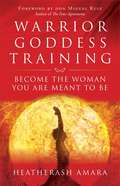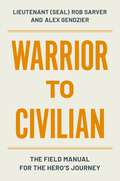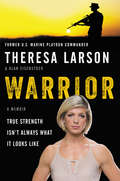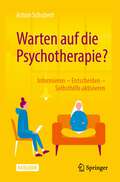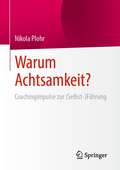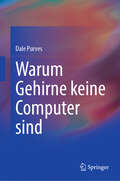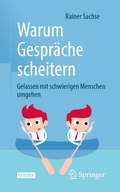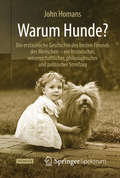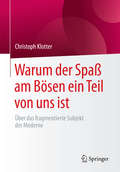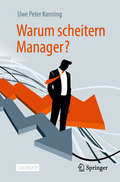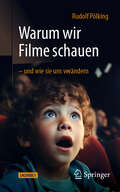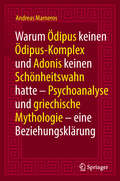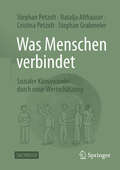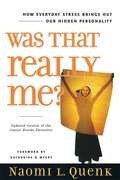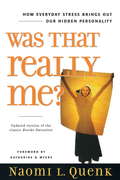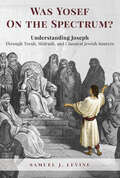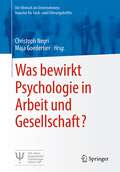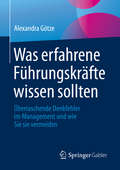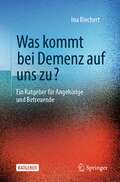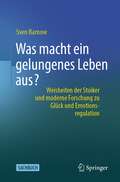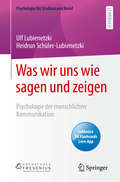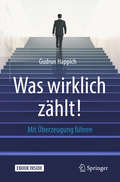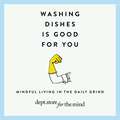- Table View
- List View
Warrior Goddess Training
by Heatherash AmaraThis is a book that teaches women to see themselves as perfect just the way they are; to resist society's insistence that they seek value, wholeness, and love through something outside themselves, such as a husband, children, boyfriend, career, or a spiritual path. Author HeatherAsh Amara has a message for women struggling to find themselves under these false ideals: If you don't love and honor yourself with every fiber of your being, if you struggle with owning your power and passion, then it is time for an inner revolution! It is time to claim your Warrior Goddess energy. Amara challenges women to be "warrior goddesses;" to be a woman who: Ventures out to find herself Combats fear and doubt Reclaims her power and vibrancy Demonstrates her strength of compassion and fierce love Drawing on the wisdom from Buddhism, Toltec wisdom, and ancient earth-based goddess spirituality, Amara, combines them all with the goal of helping women become empowered, authentic, and free. Also included here are personal stories, rituals, and exercises that encourage readers to begin their own journey towards becoming warrior goddesses. This is an essential tool for women interested in self-empowerment and wholeness.
Warrior Mother: A Memoir of Fierce Love, Unbearable Loss, and Rituals that Heal
by Sheila K. CollinsWarrior Mother is the true story of a mother’s fierce love and determination, and her willingness to go outside the bounds of the ordinary when two of her three adult children are diagnosed with life-threatening diseases. When Sheila Collins’s best friend, dying of breast cancer, asked her to accompany her through what turned out to be the last fourteen days of her life, she didn’t know that the experience was preparing her for what lay ahead with her own children. In the years that followed, Collins had to face both her son’s diagnosis with AIDS and her daughter’s diagnosis with breast cancer. Warrior Mother documents how she faces these challenges and the issues accompanying them—from learning to be the mother of a gay son to visiting a healer in Brazil on her daughter’s behalf when she decides on bone marrow transplant treatment. Experience as a professional social worker and family therapist doesn’t always help Collins to cope with her children’s illnesses—but her relationship with improvisational song, dance, storytelling, and women’s spirituality rituals carries her through. Warrior Mother follows Collins’s family through memorials and celebrations of lives well lived, all the while exploring the impact of grief on those left behind and the rituals that help them heal.
Warrior to Civilian: The Field Manual for the Hero's Journey
by Robert Sarver Alex GendzierA compassionate, practical guidebook for veterans transitioning from active duty to civilian life and for the loved ones supporting their journey. "Challenging yet reassuring....a key addition to every veteran&’s packing list ." --Stan McChrystal, General, US Army (Ret) and Co-Founder and CEO, McChrystal Group Some important statistics: There are over 22 million veterans alive today Each year, more than 200,000 new veterans transition out of active duty. Approximately 22 veterans commit suicide a day, and even more are living with PTSD, traumatic brain injury (TBI), struggling with substance abuse, homelessness, and experience many, many other difficulties. It's clear that we have not honored the promise we make to veterans: that we as a country will help them after they've served and sacrificed. And while there are many books written by and for veterans, only a small selection of those address the transition to civilian life, and none are a truly complete reference for stepping out of service and back into normal life. Warrior to Civilian covers a range of topics, from the practical—finding a job, reintegrating into family life—to the more challenging topics, like dealing with loss, and finding new purpose in life. This well-curated resource incorporates stories, insights, and observations from veterans and their partners; evidence-based advice from health professionals and experts who work closely with veterans; and inspiration taken from heavyweights like Jon Kabbat-Zinn and Tony Robbins. The authors take care to address the unique challenges faced by veterans of color, and those in the LGBTQ+ communities. With support from some of our country's most recognizable military members, authors Rob Sarver, a former SEAL, and Alex Gendzier, combine their voices and their experiences in and out of the military in a unique way that will make this resource shine. Scaffolded by the hero's journey, in which the hero experiences a series of transformative events, they reveal that within the loss that many veterans have suffered while serving and suffer in the transition, there is great opportunity for healing.
Warrior: A Memoir
by Alan Eisenstock Theresa LarsonIn this inspiring memoir, a former female Marine platoon leader recalls the wars she has fought--on the playing field, the battlefield, and inside her own soul--revealing how overcoming the harrowing circumstances in her life helped her ultimately redefine what it means to be strong and what "perfect" really is.Theresa Larson has lived multiple lives. At ten she was a caregiver to her dying mother. As an adolescent, an All-Star high school, college, and professional softball player. As a young adult, a fitness competition winner, beauty pageant contestant, and model. And as a grown woman, a high-achieving Lieutenant in the Marines, in charge of an entire platoon while deployed in Iraq.Meanwhile, Theresa was battling bulimia nervosa, an internal struggle which ultimately cut short her military service when she was voluntarily evacuated from combat. Theresa's journey to wellness required the bravery to ask for help, to take care of herself first, and abandon the idea of "perfect." In Warrior, she lays bare all of these lives in intimate and vivid detail, examining extremely personal and sometime painful moments and how, by finally accepting the help of others, she learned to make herself whole. From growing up in a log cabin outside Seattle to facing down the enemy in Iraq, Theresa's journey demonstrates that good health and happiness is a daily, intentional act that requires persistence and commitment.Theresa hopes that through sharing her story, she will help inspire others to empower themselves, embrace their inner warrior and re-define strength. Startling and funny, terrifying and triumphant, heartbreaking and inspirational, Warrior is at heart a story of perseverance and success--of a determined woman who is model for everyone struggling to conquer their own demons. Theresa shows that asking for help can be an act of courage, and that we are stronger than we think when faced with seemingly impossible odds.
Warten auf die Psychotherapie?: Informieren – Entscheiden – Selbsthilfe aktivieren
by Achim SchubertDer Bedarf an Psychotherapie ist so groß wie nie zuvor, die Versorgung mit Therapieplätzen für kompetente Psychotherapien aber nach wie vor sehr knapp. Therapiesuchende müssen sich daher oft auf lange Wartezeiten einstellen und von Psychotherapeut*innen vertröstet und auf Wartelisten gesetzt werden.Statt abzuwarten und weiter geschehen zu lassen, dass sich die Therapiesuchenden als Opfer mangelnder Versorgung fühlen, liefert dieser Ratgeber betroffenen Personen vorbereitende Informationen, was sie in einer Psychotherapie erwartet, sowie anschauliche Beispiele in Form gängiger Fallgeschichten, die dabei helfen sollen, eigene problematische Denk- und Verhaltensweisen aufzudecken und hilfreiche Narrative abzuleiten. Darüber hinaus bietet dieses Buch praktische Hilfe zur Selbsthilfe, zur Linderung von Symptomen sowie Möglichkeiten zur individuellen und zielführenden Vorbereitung einer Psychotherapie.
Warum Achtsamkeit?: Coachingimpulse zur (Selbst-)Führung
by Nikola PlohrDas Buch folgt dem Anliegen, einen Dialog zu eröffnen und zum Nachdenken und Reflektieren anzuregen. Der Prozess, durch den das Buch die Leser*Innen leitet ist für alle geeignet, die sich mehr mit sich selbst und ihren inneren Mustern beschäftigen möchten und auch offen sind für neue Anregungen im Umgang mit anderen. Der Text führt von innen nach außen, aus der Theorie in die Praxis und aus der Reflexion ins Tun. Der erste Teil, Inner Leadership, widmet sich den vielschichtigen Möglichkeiten zur Selbstreflexion, die für das zeitgenössische Verständnis von Führung unabdinglich ist. Achtsamkeit hält als Praxis und Begriff den Raum für die Hinwendung zum Innenleben, den inneren Geschichtenerzähler*Innen, dem individuellen Umgang mit Kritik, Emotionen und dem allgegenwärtigen Streben nach Anerkennung. Im zweiten Teil wird die teambasierte Führungspraxis in den Fokus gerückt. Unter dem Schlagwort Mindful Leadership werden einige der vielen zwischenmenschlichen Ebenen und Verbindungen beleuchtet, die nicht nur das Arbeitsleben prägen. Darunter: Kommunikation, Inspiration, Mut, Entscheidungen, sowie Zugehörigkeit und Nachhaltigkeit. Jedes Kapitel endet mit Reflexionsfragen und Übungen, die aus der Theorie in die Praxis überleiten.
Warum Gehirne keine Computer sind
by Dale PurvesDieses Buch untersucht die scheinbar grundlegende Herausforderung in der Neurowissenschaft von heute: zu verstehen, wie die vom menschlichen Gehirn erzeugte Erfahrung mit der physischen Welt, in der wir leben, in Beziehung steht. Die 25 kurzen Kapitel präsentieren das Argument und die Beweise, dass Gehirne dieses Problem auf einer rein trial-and-error-Basis angehen. Das Ziel ist es, Neurowissenschaftler, Informatiker, Philosophen und andere interessierte Leser dazu anzuregen, dieses Konzept der neuronalen Funktion und seine Implikationen zu hinterfragen. Eine der Schlussfolgerungen ist dabei, dass Gehirne nicht „rechnen“.
Warum Gespräche scheitern: Gelassen mit schwierigen Menschen umgehen
by Rainer SachseDieser Ratgeber hilft Ihnen, wenn Sie im Alltag regelmäßig schwierigen Interaktionssituationen ausgesetzt sind. Beispiel: Interaktionspartner kritisieren, werten ab, reagieren ärgerlich aus scheinbar nichtigen Anlässen, geben Anweisungen, ohne dazu berechtigt zu sein, manipulieren usw. Solche Handlungen gehen meist von Personen aus, die sogenannte Persönlichkeitsstile oder Persönlichkeitsstörungen aufweisen. Sie empfinden das als stressig, unangenehm, belastend oder ärgerlich und es ist meist schwierig, konstruktiv damit umzugehen? Dann sind Sie in bester Gesellschaft. Das Buch soll verständlich machen, warum Personen solche Handlungen ausführen, was sie damit wollen und wie Sie konstruktiv damit umgehen können. Geeignet für Partnerschaft, Familie, bei der Arbeit mit Kollegen und Chefs oder auch bei Menschen, mit denen man nur wenig (aber schwierigen) Kontakt hat. Hilfreiche Strategien aus dem Inhalt: Gelassen bleiben, entspannt bleiben – nicht aggressiv reagieren – nicht mit gleicher Strategie aufwarten – nicht defensiv reagieren – souverän bleiben. Über den Autor: Prof. Dr. Rainer Sachse macht komplexe psychologische Sachverhalte allgemein verständlich und stellt sie humorvoll und einfühlsam dar. Das ist für Laien ebenso mit Gewinn lesbar wie für Fachkolleginnen und -kollegen.
Warum Hunde?: Die erstaunliche Geschichte des besten Freunds des Menschen – ein historischer, wissenschaftlicher, philosophischer und politischer Streifzug
by John HomansWas Hunde und Menschen füreinander sind In Warum Hunde? erkundet John Homans die besondere Rolle, die Hunde in unserer Welt spielen. Über Jahrtausende hinweg entwickelte sich der Hund zuerst vom Wildtier zum Arbeitstier und dann zu einem fast ebenbürtigen Mitglied des menschlichen Sozialgefüges. Heute sind Hunde aus unserem Alltag nicht mehr wegzudenken. Sie sind treue Begleiter und Helfer, ein bedeutender Wirtschaftsfaktor und beliebte Objekte wissenschaftlicher Untersuchungen zu Themen wie Tierhaltung, Evolution und Kognition. Homans beschreibt nicht nur, warum Hunde auf Menschen so anziehend wirken und in welcher Weise sie sogar unserer Gesundheit zuträglich sind, sondern geht auch der Frage nach, warum sich die Beziehung zwischen Mensch und Hund im letzten Jahrhundert so rasant verändert hat. Wie schafften es Hunde innerhalb kürzester Zeit, unsere Familien, unsere Häuser und manchmal gar unsere Betten zu erobern und einen milliardenschweren Wirtschaftszweig entstehen zu lassen?[Ein] hinreißendes, informatives Buch, zugleich eine Darstellung der jüngsten Forschungsergebnisse zum Thema Hund und der Erinnerungen von Homans an die Jahre mit seiner Mischlingshündin Stella … bewegend und rundum gelungen. New York Times Book ReviewEine bemerkenswerte Chronik jener Reise, die den Haushund über Jahrtausende hinweg direkt in unsere Herzen führte, geschrieben mit viel Gefühl und zugleich wissenschaftlich fundiert … Eine wunderbare, fesselnde Lektüre. The Atlantic_____Der Hund als Teil der menschlichen KulturOhne Stella gäbe es dieses Buch nicht. Der Labradormischling aus dem Tierheim inspirierte John Homans dazu, sich in die komplexe Welt der Hunde mit all ihren Facetten zu vertiefen, von der Stammesgeschichte bis zur Tierrechtsbewegung, von Zuchterfolgen und Designerhunden bis hin zum steten Wandel der Beziehung zwischen Mensch und Hund.Homans hatte das Tierheim aus denselben Gründen aufgesucht wie viele andere Menschen auch – ihm waren Hunde aus seiner Kindheit vertraut, er suchte einen Gefährten für seinen kleinen Sohn und vielleicht auch einen Vorwand, um ausgedehnte Streifzüge durch sein Viertel zu unternehmen. Schnell fügt sich Stella in den Tagesablauf der Familie ein, und mehr noch: Sie wird, anders als die Hunde seiner Jugend, wie ein vollwertiges Familienmitglied behandelt. Tierarztrechnungen in astronomischer Höhe, Diskussionen über richtige Ernährung und ausreichende Bewegung sowie die Sorge, ob sie wohl glücklich ist – all dies wirft die Frage auf, warum sich das Leben von Hunden in unserer Gesellschaft so verändert hat, wo doch die Hofhunde aus Homans‘ Kindheit offenbar auch ganz zufrieden gewesen waren.Der tiefgreifende kulturelle Wandel in der Beziehung zwischen Mensch und Hund und seine Hintergründe sind das Thema dieses Buches. John Homans hat dafür Gespräche mit Wissenschaftlern, Tierschützern, Züchtern und Trainern geführt und aktuelle Forschungsergebnisse aus ganz unterschiedlichen Disziplinen zusammengetragen. Hunde sind für viele von uns nicht zuletzt deshalb so faszinierend, weil sie mit einer Pfote in der Tier- und mit einer in der Menschenwelt stehen. So können sie uns eine Menge über Liebe, Tod und Moral beibringen – und da sie uns nah und dennoch so anders sind, auch über das Menschsein.
Warum der Spaß am Bösen ein Teil von uns ist
by Christoph KlotterIn der Auseinandersetzung mit de Sade und Freud erhält der Leser eine Anregung, die Geschichte des Bösen neu zu denken, das Böse als Teil des Menschen und seiner Kultur zu denken. Neben Errungenschaften wie Demokratie, Menschenrechten und persönlicher Freiheit wird nämlich zu oft vergessen, dass dieser Kultur auch Schattenseiten innewohnen. Dass der Mensch fragmentiert ist, widersprüchlich fühlt und handelt, wird negiert. Als Folge vertieft sich seine Zerrissenheit. Das Buch ist somit auch eine Anregung für die wachsende Anzahl derer, die sich derzeit darüber Gedanken machen, warum das Böse offenkundig erstarkt und sich ungehemmt zeigt.
Warum scheitern Manager?
by Uwe Peter KanningManagementfehler haben mitunter weitreichende Konsequenzen für viele Menschen, die davon unmittelbar oder indirekt betroffen sind. Fast jeder kennt Fälle in seinem Umfeld oder glaubt Betroffener von Managementfehlern zu sein. Wenn Sie wissen möchten, wie Managementfehler entstehen und wodurch sie sich ein Stück weit eindämmen lassen, ist dieses Buch genau richtig für Sie, denn hier werden beispielsweise die folgenden Fragen beantwortet: Wie wird man (Spitzen-)Manager*in?An welchen Eigenschaften scheitern Manager*innen? Warum treffen Manager*innen Fehlentscheidungen?Wie täuschen Manager*innen sich und andere?Warum werden sie nicht frühzeitig gestoppt? Anhand von interessanten Informationen und Stories erhalten Sie einen Einblick in konkrete und bekannte Fälle von Missmanagement. Aufgrund der augenöffnenden Analyse, die auf psychologischen Erkenntnissen basiert, können Sie wertvolle Schlussfolgerungen ziehen. Zielgruppen: Berufstätige und alle, die sich ein gutes Management wünschen, sowie diejenigen, die Führungskräfte, Manager und Managerinnen, einstellen, sie führen oder mit ihnen zusammenarbeiten. Zum Autor: Prof. Dr. phil. habil. Uwe Peter Kanning ist Professor für Wirtschaftspsychologie an der Hochschule Osnabrück. Er ist Autor zahlreicher Bücher. Seine Arbeit wurde vielfach ausgezeichnet, u.a. 2016 „Professor des Jahres“ (UnicumBeruf) oder 2019 Wahl unter die „40 führenden Köpfe des Personalwesens“ (Personalmagazin). Seit 1997 berät er Unternehmen und Behörden bei wirtschaftspsychologischen Fragestellungen.
Warum wir Filme schauen – und wie sie uns verändern
by Rudolf PölkingFilmerlebnisse prägen uns. Filme sprechen sehr viele Teile unserer Persönlichkeit an. Während des Schauens werden unterschiedliche innerpsychische, physische und gesellschaftliche Prozesse in Gang gesetzt. Einige von diesen sind bis dato kaum im Fokus der Öffentlichkeit. Dass Medienwelten uns verändern, gilt als weitgehend unbestritten. Doch worauf beruht diese Wirkung und welche Folgen hat sie, insbesondere solche, die bislang wenig Beachtung finden?Dieses Buch geht diesen Fragen nach. Es beleuchtet die Vielfalt innerer und äußerer Wirkmechanismen, die beim Filmgenuss aktiv werden. Eine mögliche Konsequenz der neuen virtuellen Welten kann Mediensucht sein. Weitreichender jedoch ist der kulturelle Wandel, der sich durch unsere zunehmende Hinwendung zu Filmwelten und sozialen Medien vollzieht – eine Zeitenwende, deren Dynamik gerade erst beginnt.
Warum Ödipus keinen Ödipus-Komplex und Adonis keinen Schönheitswahn hatte: Psychoanalyse und griechische Mythologie - eine Beziehungsklärung
by Andreas MarnerosÖdipus, Iokaste, Laios, Antigone, Elektra oder Adonis – diese und viele andere Vertreter der griechischen Mythologie werden seit Sigmund Freud als Namensgeber für Komplexe, Syndrome oder Theorien der Psychoanalyse verwendet. Manche dieser Begriffe sind nach wie vor fest im psychiatrischen, psychologischen oder sonstigen psychotherapeutischen Sprachgebrauch verankert; manchmal reichen sie gar bis in die Alltagssprache hinein. Kenner sind sich einig, dass die griechische Mythologie die Psychoanalyse geradezu ernährt. Der Autor dieses Buches begibt sich als Psychiater und profunder Kenner der griechischen Mythologie auf eine spannende Spurensuche, um der Beziehung zwischen Psychoanalyse und griechischem Mythos einmal richtig auf den Grund zu gehen: Beziehen sich die Schöpfer eines psychoanalytischen Komplexes – beginnend bei Sigmund Freud – eigentlich berechtigterweise auf den namensgebenden griechischen Mythos? Oder haben sie diesen eventuell angepasst oder gar gebeugt, um ihn mit der kreierten Theorie kompatibel zu machen? Interessierte an Psychotherapie und griechischer Mythologie finden hier eine unterhaltsam lesbare, manchmal humorvolle und persönliche, in jedem Fall lehrreiche Lektüre jenseits „trockener Fachliteratur“ – und hoffentlich so manches „Heureka-Erlebnis“.
Was Menschen verbindet: Sozialer Klimawandel durch neue Wertschätzung
by Stephan Petzolt Natalja Althauser Cristina Petzolt Stephan GrabmeierDieses Buch entwickelt die relevanten Facetten von Wertschätzung und zeigt die Verbindung zu Wertschöpfung in Zeiten von Industrie 4.0, der Digitalisierung und des Klimawandels auf. Dabei wird deutlich, dass Wertschätzung sowohl für den Einzelnen, als auch für das Miteinander einen besonderen Stellenwert hat. Wertschätzung sorgt für Selbstbewusstsein, Selbstwirksamkeit und bildet die Grundlage für adäquate Kommunikation auf Augenhöhe. Auf organisationaler Ebene bewirkt Wertschätzung eine Verminderung von Komplexität und ermöglicht angstfreie Räume ohne Repressalien. Das Buch zeigt neue Formen der Wertschöpfung, in denen Risiken und Fehler frühzeitig erkannt werden und der Auftrag der Organisation im Zentrum kollektiver Aktivitäten steht. Darüber hinaus bietet Wertschätzen praktische Anregungen sowohl zur individuellen als auch organisationalen Weiterentwicklung.
Was That Really Me?: How Everyday Stress Brings Out Our Hidden Personality
by Naomi L. QuenkPsychologist Naomi Quenk discusses the stress patterns that various personality types experience. Using Jungian psychological type theory and the MBTI© personality inventory, Quenk helps readers turn their moments of stress into gems of personal understanding and growth. Work-related stress and the effects of stress over time are both explored in Was That Really Me?, as is a simple explanation of type dynamics, type differentiation, and type development. Including discussions of how each of the sixteen personality types functions at work and what each finds stressful or energizing, plus new stories about people in the grip of their inferior functions, Was That Really Me? helps readers learn from moments of stress.
Was That Really Me?: How Everyday Stress Brings Out Our Hidden Personality
by Naomi L. QuenkIn Was That Really Me?, Naomi Quenk has provided the next giant step in applying Jung’s model of development in healthy personalities. That step is to understand, accept, and learn to handle our hidden personality responsibly. Updating the classic Beside Ourselves, Quenk has given us a way to understand this part of ourselves as well as a practical guide for turning what appears to be negative into a positive awareness that enhances our growth and effectiveness. People typically find this to be a surprisingly freeing experience.
Was Yosef on the Spectrum?: Understanding Joseph Through Torah, Midrash, and Classical Jewish Sources
by Samuel J. LevineYosef's behaviors, interpersonal relationships, and personal development are often difficult to understand and seem to defy explanation. This book presents a coherent and cohesive reading of the well known Bible story that offers a plausible account of Yosef's behaviors, specifically those of an individual on the autism spectrum. Viewed through this lens, Yosef emerges as a more familiar and less enigmatic individual, exhibiting both strengths and weaknesses commonly associated with autism spectrum disorder.
Was bewirkt Psychologie in Arbeit und Gesellschaft? (Der Mensch im Unternehmen: Impulse für Fach- und Führungskräfte)
by Christoph Negri Maja GoedertierWas bewirkt Psychologie in Arbeit und Gesellschaft?Zum hundertjährigen Bestehen des IAP, dem Institut für Angewandte Psychologie in Zürich, bietet dieses IAP Jubiläumsbuch einen reflektierten Überblick sowie wertvolle Einblicke in die vielfältigen Tätigkeits- und Forschungsbereiche des IAP in der Angewandten Psychologie.Basierend auf dem Erkenntnisgewinn von einhundert Jahren zeigt es auf, wie die Angewandte Psychologie als zentrale Bereicherung für die Gesellschaft und die Arbeitswelt wirkt und wie sich die Angewandte Psychologie über diese Zeitspanne weiterentwickelt hat. Anschauliche Beispiele und fundierte Erkenntnisse von Psychologinnen und Psychologen zu folgenden Themengebieten machen diese Lektüre für jeden zu einer Bereicherung:Historie und Zukunft der psychologischen Tätigkeit am IAPPsychologische Diagnostik und BeratungFührungLehren und LernenCoachingLaufbahngestaltungOrganisationsberatung Jedes Kapitel enthält:Kurzreflexion mit Hinweisen, woher das Wissen am IAP stammtInsights in die aktuellen Tätigkeitsfelder und was das IAP bieten kannAusblick und zukunftsgerichtete TrendsZusätzlich ist das Buch mit digitalen Beiträgen, d.h. Videoclips, angereichert. Zu den HerausgebendenProf. Dr. Christoph Negri ist Leiter des IAP Institut für Angewandte Psychologie an der ZHAW Zürcher Hochschule für Angewandte Wissenschaften. Seit 2015 führt er am IAP verstärkt neue Entwicklungen im Bereich Lernen und Lehren ein und treibt den digitalen Wandel im Institut und in der Weiterbildung und Dienstleistung voran.Maja Goedertier ist Beraterin am IAP Institut für Angewandte Psychologie an der ZHAW Zürcher Hochschule für Angewandte Wissenschaften. Ihr psychologisches Wissen und Können, verbindet sie mit langjähriger Erfahrung als psychologische Beraterin.
Was die Chirurgie fürs Leben lehrt: Erfolgsrezepte eines erfahrenen Operateurs
by Rüdiger HorstmannÄrzte gelten als Halbgötter in Weiß und Chirurgen sind für viele so etwas wie die Elite der Ärzteschaft. Der Chirurg hat das Image eines Machers, er fasziniert, sein Alltag erscheint vielen unheimlich spannend und spektakulär. Schließlich verabreicht er keine Pillen, nein, er schneidet in die Haut – und das ist immer eine Grenzerfahrung.Dieses Buch ermöglicht einen Blick hinter die hermetisch verschlossenen Türen der OP-Säle. Was geht dort vor sich? Welche Fähigkeiten muss der Operateur besitzen? Wie fokussiert er sich und wie bekommt er seine Emotionen in den Griff? Fragen wie diese werden in den dreizehn Kapiteln des Buches beantwortet – und das nicht in Form theoretischer Abhandlungen oder fiktiver Geschichten, sondern anhand ganz konkreter Erfahrungen des Autors, die er in seiner über 40-jährigen beruflichen Laufbahn sammeln durfte.Und es zieht Parallelen zum Leben außerhalb der Krankenhäuser, da letztlich in jedem Unternehmen und für jeden Menschen dieselben Fähigkeiten und Eigenschaften wichtig sind: sich fokussieren und Ziele setzen, handeln und Druck von außen managen, innovativ sein und das Team einbinden. Mit den konkreten Handlungsanleitungen gelingt die Umsetzung ganz einfach im Beruf oder privaten Alltag.
Was erfahrene Führungskräfte wissen sollten: Überraschende Denkfehler im Management und wie Sie sie vermeiden
by Alexandra GötzeWährend in den Medien fortwährend neue Führungsfähigkeiten proklamiert werden, die für die Mitarbeiterführung in komplexen Arbeitswelten unverzichtbar sein sollen, beißen sich aktuell die Chefs in den Unternehmen an überraschend alten Führungsthemen die Zähne aus: Ineffiziente Meetings, in denen viel diskutiert und wenig entschieden wird. Neue Projekte, die sich in ihrer Bedeutsamkeit nahezu stündlich den Rang ablaufen und das belastende Gefühl, dass das eigene Arbeiten immer behäbiger wird, während vom Vorstand Agilität ausgerufen wird. Dieses Buch gibt einen detaillierten Einblick über drei Schwerpunktthemen, die derzeitige Führungskräften im Business Coaching besprechen, verstehen und reflektieren möchten. Drei Themen, die – trotz aller Individualität des Klientenumfelds – umfassend für die existierenden Herausforderungen aktueller Führungsarbeit stehen: Selbststeuerung, Arbeitsmethodik und Kommunikation. Themen, die – speziell von erfahrenen Führungskräften – nicht (mehr) als Stolpersteine ausgemacht werden und gerade deswegen eine besondere Beachtung verdienen. Ein Buch für Führungskräfte, die die eigenen Führungsprinzipien hinterfragen wollen oder müssen.
Was kommt bei Demenz auf uns zu?: Ein Ratgeber für Angehörige und Betreuende
by Ina RiechertEine beginnende Demenz wird oft verdrängt. Die Frage ist immer wieder: Ist das schon dement oder doch nur tüdelig? Die Menschen wollen diese Krankheit nicht wahrhaben und doch nimmt sie ihren weiteren Verlauf. Es fehlt dabei oft die Zeit und die Muße sich umfassend über Hilfsmöglichkeiten und Erleichterungen zu informieren. Dieses Buch ist ein Leitfaden für Angehörige und Betreuende und will Mut machen für einen würdevollen Umgang mit den Betroffenen. Es werden Möglichkeiten aufgezeigt, dieser Krankheit durch eine gezielte und begleitende Unterstützung im eigenen Zuhause oder einer Pflegeeinrichtung zu begegnen. Unterschiedliche Stationen werden anhand von Fallerzählungen anschaulich dargestellt und durch aktuelle medizinische und psychologische Informationen ergänzt. Praktische Tipps und Hilfsangebote für Angehörige und Betreuende runden diesen Leitfaden ab.
Was macht ein gelungenes Leben aus?: Weisheiten der Stoiker und moderne Forschung zu Glück und Emotionsregulation
by Sven BarnowIIn diesem Buch geht es darum, die Annahmen der Stoiker mit der aktuellen Emotions- und Glücksforschung zu verbinden. Das stoische Versprechen, dass mit Übung und Praxis stoischen Denkens der Mensch auch schwere Stürme des Lebens gelassen überstehen und sogar daran wachsen kann, ist ermutigend. Aber ist es auch wahr? Leser und Leserinnen, die sich für den Stoizismus interessieren und sich gleichzeitig einen gut lesbaren Überblick über die aktuelle Glücks- und Emotionsforschung verschaffen wollen, sei dieses Buch ans Herz gelegt. Aus dem Inhalt: Stoische Lebensleitlinien: Prinzip 1: Lebe fokussiert, hüte dich vor Ablenkungen. Prinzip 2: Lebe einfach. Prinzip 3: Lerne die Emotionen zu beherrschen, um glücklich zu sein. Prinzip 4: Minimiere die egozentrischen Bedürfnisse des Egos. Prinzip 5: Hinterfrage dein Verlangen nach Anerkennung. Prinzip 6: Akzeptiere, was nicht deiner Kontrolle obliegt. Prinzip 7: Übe Dich in Dankbarkeit. Über den Autor: Prof. Dr. Sven Barnow leitet den Lehrstuhl für Klinische Psychologie und Psychotherapie am Psychologischen Institut der Universität Heidelberg. Neben seinem wissenschaftlichen Engagement im Bereich der Emotionsforschung interessiert er sich für den Stoizismus, da diese Lebensphilosophie sich unter anderem mit der Frage auseinandersetzt hat: Wie Emotionen regulieren?
Was wir uns wie sagen und zeigen: Psychologie der menschlichen Kommunikation (Psychologie für Studium und Beruf)
by Heidrun Schüler-Lubienetzki Ulf LubienetzkiDieses kompakte Lehrbuch bringt Ihnen – unterhaltsam wie ein Sachbuch – die psychologischen Grundlagen der menschlichen Kommunikation näher. Sie begegnen darin wegweisenden Konzepten, Modellen und Axiomen der Kommunikation (dabei auch bekannten Namen wie Paul Watzlawick und Friedemann Schulz von Thun), unterschiedlichen Sichtweisen auf Kommunikation sowie verschiedenen Kommunikationsstilen und -mustern. Sie erfahren, was es bedeutet, erfolgreich zu kommunizieren und wodurch erfolgreiche Kommunikation erschwert oder sogar verhindert wird. Und quasi im Vorbeigehen lernen Sie, Ihre eigene Kommunikation und damit sich selbst besser zu verstehen.
Was wirklich zählt!: Mit Überzeugung führen
by Gudrun HappichAn der Spitze stehen, erfolgreich sein und sich trotzdem ohnmächtig, überfordert, unzufrieden und einsam zu fühlen – das kommt häufiger vor als manche glauben. Warum? Um Erfolg und Erfüllung verbinden zu können, benötigen wir den richtigen Platz, der unseren Stärken und Talenten entspricht. Ähnlich wie Pflanzen verkümmern wir, wenn die Rahmenbedingungen uns nicht entsprechen. Wenn wir dagegen unser (Berufs-) Leben im Einklang mit unserer inneren Überzeugung gestalten, können wir Leistung mit Leidenschaft und Leichtigkeit verbinden. In diesem Buch lernen Sie vier Top-Führungskräfte kennen. Ihre Karrieren, Ängste, Zweifel und Hoffnungen sind exemplarisch für viele andere. Begleiten Sie sie dabei, wie sie ihren persönlichen Weg zu Erfolg und Erfüllung gehen und machen Sie sich selbst auf den Weg. Sie finden dazu viele Praxis-Tipps und Übungen. Von der vielfach bewährten Vorgehensweise profitieren der Einzelne und das Unternehmen – denn Mensch und System lassen sich nicht trennen. Ein Mensch in der falschen Position kann ein ganzes Unternehmen gefährden. Andersherum: Wer wirklich überzeugt ist, von dem was er tut, hat immer Erfolg – und Spaß daran.Dieses Sachbuch ist eine Weiterentwicklung des erfolgreichen Fachbuchs "Was wirklich zählt!", Springer Gabler 2014.
Washing Dishes is Good for You: Mindfulness in the daily grind
by Dept LtdCan washing up really be good for you? Can we discover a moment of insight, a wave of calm, a tickle of delight or a tingle of connection within our simple, readily available, everyday routine? Without needing to alter our entire lifestyle, can we unearth a fresh way in, hidden inside the daily and seemingly mundane? How might we flip our thinking away from resisting and towards maybe even relishing the washing up, the cleaning and the cooking? What might this do for our body, our mind and our relationships? One everyday activity at a time, artists, designers, writers, psychologists and speakers share their stories and experiences of the everyday. You will hear of family bonding over the washing up, wondrous rituals with a cup of tea and the creation of playful households. So, yes, we are suggesting that washing up can be good for you. In fact, even more than good for you! It can be liberating, relaxing, creative and healing. These ideas are deeply embedded in some of the world's most ancient wisdom. Here, we simply explore how this way of thinking can very easily become part of our daily doing.(p) 2017 Octopus Publishing Group
